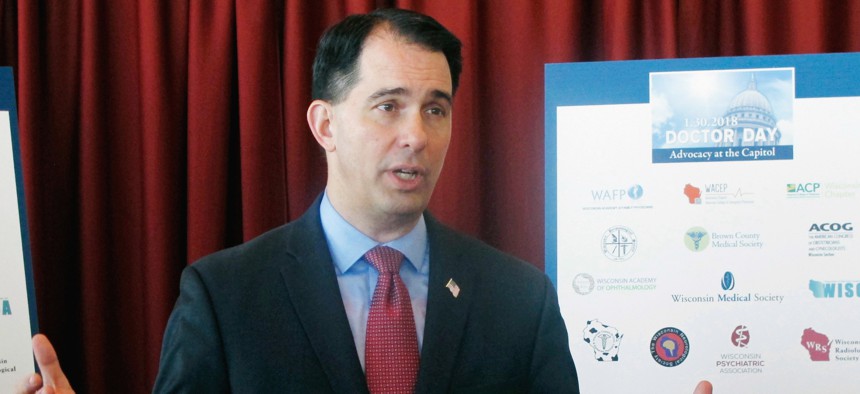Wisconsin’s Outgoing Governor OKs Bills to Limit Executive Powers of His Successor

In this Jan. 30, 2018, file photo, Wisconsin Gov. Scott Walker speaks at a news conference in Madison, Wis. AP Photo

Connecting state and local government leaders
Democratic Gov.-elect Tony Evers criticized the legislation as ignoring "the will of the people."
Outgoing Wisconsin Gov. Scott Walker signed a controversial set of bills Friday that includes limits on the power of his successor, saying that Democrat Tony Evers will still have substantial authority when he takes office next month.
Walker, a Republican who is nearing the end of his eight years in office, said there had been “a lot of hype and hysteria” about the three bills he signed.
“The overwhelming executive authority that I as governor have today will remain constant with the next governor,” he said, calling the position one of the most powerful in the country. He noted, for example, the governor’s broad line-item veto authority, while saying the legislation will improve transparency and accountability.
The three bills were passed during a recent lame-duck session of the legislature, which sparked protests from voters who said lawmakers were ignoring the results of the recent election that saw Democrats make significant gains in state offices. The state assembly, however, remains held by Republicans.
Evers, who defeated Walker in November, criticized him for signing the legislation, saying he had chosen “to ignore and override the will of the people of Wisconsin. This will no doubt be his legacy.”
The Associated Press reported that Evers said he is looking at his options for how to respond to the new laws, but didn’t elaborate on what that might mean. Former U.S. Attorney General Eric Holder, who worked under President Obama, told the AP his organization would work with a Wisconsin-based group to file a lawsuit against a measure that limits early voting. Holder called the law a "shameful attack on our democracy."
Under that new law, jurisdictions will only be allowed to offer two weeks of early voting, a change that many expected would hurt Democrats who have relied on expanded voting days in turning out their voters.
State Assembly Speaker Robin Vos, a Republican, heralded Walker for signing the bills, saying the governor was “acknowledging the importance of the legislature as a co-equal branch of government.”
Walker’s tenure in Wisconsin has been both tumultuous and successful, starting off in early 2011 by winning key legislative battles that crippled the strength of public sector unions in the state. He later survived a recall effort, but was not able to win a third term this fall in a race that local reporters described as largely centered on home-grown issues like education and health care. Evers, a former state schools chief, was able to highlight his experience as education grew into a key issue.
Of the package signed by Walker on Friday, part of one new law strips the incoming governor of some authority over the state’s economic development agency, giving it instead to the Republican-led legislature. A story by the Milwaukee Journal Sentinel noted that Walker’s decision to sign the legislation without vetoing any aspect of it came the day after he announced a $28 million incentive package to Kimberly-Clark Corp. to keep open a plant, the kind of move Evers won’t have the power to make without lawmakers also agreeing to a deal.
During his campaign, Evers made the Wisconsin Economic Development Corp. a big issue, saying he wanted to dismantle the public-private agency. Again this week, he criticized the Kimberly-Clark package that Walker pushed through that agency.
Under the changes, Evers would also be constrained from unilaterally pulling back from federal waivers for social services programs, while also requiring that Wisconsin move forward with work requirements for some Medicaid recipients.
The package also hems in the powers of incoming Attorney General Josh Kaul, also a Democrat, while giving the legislature the ability to enter lawsuits as a separate party from the AG’s office.
The law blocks Evers and Kaul from backing out of lawsuits without permission from the legislature, an issue that came up during the campaign as both pledged to remove Wisconsin from an ongoing federal lawsuit challenging the Affordable Care Act. The Texas judge hearing that case ruled Friday that the ACA is unconstitutional, although Democratic state AGs defending the law indicated to the Washington Post they were prepared to appeal.
PREVIOUSLY, on Route Fifty:
Laura Maggi is Managing Editor of Route Fifty and is based in Washington, D.C.

NEXT STORY: Floodwaters May Have Inundated Private Wells, But Few Were Tested For Contamination





